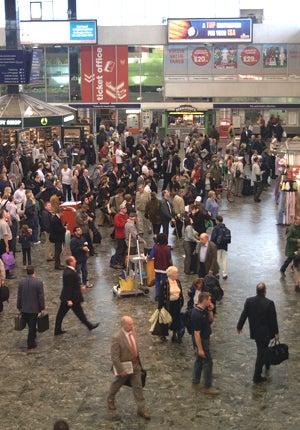At three minutes to seven on Friday evening a train leaves London's Euston Station in the direction of Manchester, virtually empty. As its few passengers glide serenely through nearby Watford Junction, the British Transport Police are scrambled to the platform from where it has just come, controlling the mad scrum of passengers fighting for a seat on the train that follows it only minutes later. The former is the last of the pricey "peak" trains, the latter the first off-peak service, and therefore considerably cheaper.
This "fares cliff edge" is just one of many problems that will be under consideration in a full review of rail fares announced by the Government, which may see some ticket prices dropping but others rising.
This review was itself one of several recommendations made in a broader report on rail industry costs by the former Civil Aviation Authority chairman Sir Roy McNulty, released yesterday.
He called for the fares review after concluding that the current system was overly complex and was not managing periods of peak demand as well as it might. The report said: "The study does not recommend an increase in fares revenue overall, but instead envisages some fares increasing and others decreasing correspondingly, within the same revenue total."
As a consequence some sought-after off-peak fares, such as those operating on Friday evenings just as the rush-hour ends, could increase in price.
Responding to the McNulty review, the Transport Secretary, Philip Hammond, said the Department for Transport would conduct "a full review of fares policy, including addressing anomalies in the current system and the potential for much greater use of smart technology".
UK rail fares are already the highest in Europe, with season ticket holders having to fork out for an average rise of the RPI rate of inflation plus 3 per cent in January 2012.
In his review, Sir Roy said rail costs should be 20-30 per cent lower than they were in 2008-09. He proposed cost-cutting measures which could deliver savings of between £700 million and £1 billion annually by 2019.
Sir Roy's report also said wages paid to rail staff were too high and working hours too short, and some ticket offices may have to be "done away with".
The review highlighted 10 key barriers to efficiency in the country's rail system, including the role of the government, the fares structure, and the way in which "major players in the industry have operated". It rejected the need for line closures, but called for "devolution and decentralisation" within Network Rail.
Sir Roy said: "It is an imperative on the industry to give taxpayers and passengers a better deal than they are getting at the moment. The problems we have are substantial but they can be fixed."
The general secretary of the RMT union, Bob Crow, condemned the report, saying: "Attacking staff, ticket offices and jacking up fares, while the train operators are handed gold-plated franchises, is just an escalation of all the worst practices of privatisation."
The recommendations
* There should be no line closures.
* Franchising should be reformed.
* There should be "devolution and decentralisation" within Network Rail.
* A Rail Delivery Group should be set up to "lead a substantial programme of change".
* The use of smartcards should be accelerated.
* The expectation that salaries at all levels of the railway industry will increase ahead of inflation must end.
* The overall trend to continually reduce the length of the working day and the working week is unsustainable.
Subscribe to Independent Premium to bookmark this article
Want to bookmark your favourite articles and stories to read or reference later? Start your Independent Premium subscription today.


Join our commenting forum
Join thought-provoking conversations, follow other Independent readers and see their replies